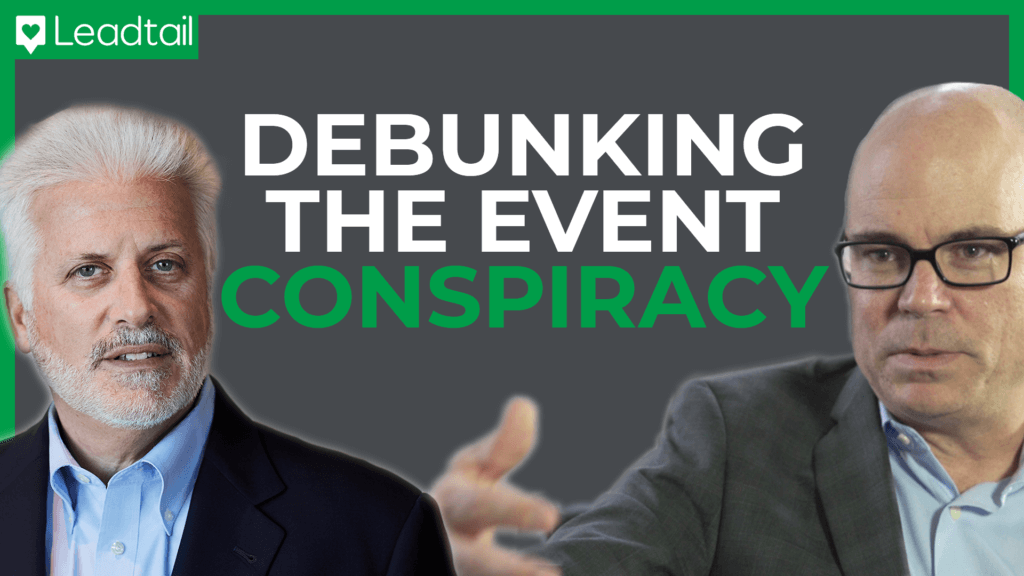Event organizers are desperate for physical events to rise from the ashes of COVID, peddling the notion that virtual events are inferior because of the formalities and customs of in-person experiences.
We’re all missing out on the free booze, the schmoozing, the intricately designed trade booths, and the 5-star Hilton outside the expo hall.
But does anyone care about this stuff anymore?
Why fly across the country to get a promotional T-shirt from a demo booth when a cup of coffee and a conversation on Zoom is just as effective?
Because of the power of the dollar.
In this CounterPoint B2B episode, host and global marketing influencer Steve Mann discusses with Chris Powell and Bill Wohl the “Event Conspiracy”—the false assumption that in-person events are better than virtual events because of all the opportunities built around these experiences. Specifically, the chance to network, collect data, and communicate face to face.
The reality?
Unlike virtual events, physical experiences benefit other industries—airline, hospitality, food and beverages, etc.—and generate billions of dollars in sponsorships, partnerships, and customized merch.
Pre-pandemic, experts predicted the global exhibition market would be worth an eye-watering $50 billion by 2025. And event organizers need to recoup these losses somehow.
What’s the truth? Is the in-person event an unparalleled networking experience? Or is it just a cash cow?
The Event Conspiracy Explained
“Do in-person events offer chance encounters with prospects, or are they just extremely expensive ways to arrange meetings?” asks Chris Powell, former CMO of data management software company Commvault, who coined the term “Event Conspiracy”.
Powell says there’s an entire event-industrial complex built around in-person events and, for years, brands have over-inflated their importance. The truth: In-person and virtual events are pretty much equal. COVID has exposed it all. Plus, there might not be as much of a demand for physical events post-pandemic.
Still, event organizers will have you think otherwise. Part of the Event Conspiracy, Powell says, is the relative failure of virtual events, which makes us crave in-person experiences even more.
“A lot of the financial models that fund virtual events are the same models that funded physical events. Virtual experiences are not good experiences. Some physical events that moved online are doing better than others. But it’s not working.”
Putting the content of physical events to one side, let’s look at the so-called “benefits” of these experiences:
- Brand awareness
- Connecting with a global audience
- Finding valuable partnerships
- Creating professional bonds
- Moving prospects through sales and marketing funnels
- The opportunity to convert leads into sales
Don’t digital events do the same?
Exposing the Event Conspiracy
COVID exposed the Event Conspiracy, and brands now realize that human interactions, whether at trade shows or on Zoom or Teams, are more important than networking at the airport lounge.
Bill Wohl, the founder of global brand communications consultancy Wohl Communications, thinks this realization is temporary. In-person events will remain the status quo for live experiences because of our inherent need to connect with other humans in real-world environments.
He says, “We’re going to see a return to in-person business because all of us, with perhaps the exception of chief financial officers, understand the value of coming together as humans. Ultimately, the question will be, ‘Has Zoom replaced business travel and in-person meetings?’ For the next 18-24 months, we can all say yes. But very quickly, that’s all going to change.”
But what about COVID, the event that exposed the Event Conspiracy?
According to Wohl, “At some point, we need to realize the danger associated with physical contact will eventually move into the rearview mirror.”
When that happens, physical events might look different.
“Two or three years down the line, what parts of these experiences will come back?” Powell wonders. “Personally, I don’t need to sit in a booth to see a demo of a product. I can do that online. But what I can’t do is have a real conversation.”
Let’s Continue the Conversation
The Event Conspiracy conversation is an important one for marketing leaders, and you can watch the entire discussion here.
What do you think? Are in-person events better than virtual events? And will in-person return in the same way in the future? Let us know.
Want to have a conversation about social media? Let’s talk.
